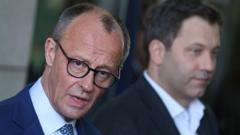In the wake of the previous government's collapse, Germany's conservatives and Social Democrats seal a coalition deal, promising reforms and economic revitalization.
Germany's Conservatives Reach Coalition Deal with Social Democrats

Germany's Conservatives Reach Coalition Deal with Social Democrats
Chancellor-in-waiting Friedrich Merz declares a new era for Germany with a coalition aimed at strong governance.
Germany's political scene is undergoing a significant transformation as Friedrich Merz, the leader of the Christian Democrats, has successfully negotiated a coalition agreement with the Social Democrats, marking a pivotal moment for the country following five months of governmental instability. Speaking to the media, Merz, 69, expressed optimism about the deal, emphasizing its intent to establish a "strong government capable of action" that resonates with both the German populace and the broader European Union.
Prior to this negotiation, Germany was already grappling with a recession exacerbated by global economic pressures, particularly from trade tariffs imposed by US President Donald Trump. Merz's message was clear: "Germany is back on track," he affirmed, outlining his commitment to fulfilling defense responsibilities and enhancing the nation's economic competitiveness.
The coalition partners, under mounting pressure to stabilize the political landscape after Merz's significant electoral win in February, have signaled a strong intent to push through meaningful reforms. One major goal in the coalition agreement is addressing immigration concerns, with a commitment to enforce stricter border controls and effectively reduce irregular migration. The far-right Alternative for Germany (AfD) criticized the measures, alleging that they fall short of adequate action.
Merz's coalition deal also aims to substantially increase defense spending amidst alarming reports about the current state of the military, which is facing critical shortages in personnel and resources. Rejecting the return of conscription, Merz mentioned a preference for a "Swedish model" of voluntary military service as a means to strengthen the Bundeswehr, Germany's armed forces.
As the new parliament prepares to convene during the week of May 5, Merz is poised to become chancellor, supported by a 13-seat majority. In this fresh coalition landscape, continuity will be maintained at the defense ministry, allowing Boris Pistorius, the Social Democrat incumbent, to continue his role.
While Merz expressed confidence in the coalition's prospects and the party's ability to navigate the upcoming weeks unscathed, critics argue that the proposed measures do not adequately address the economic challenges facing Germany, suggesting a risk of prolonged recession, dubbed "Merzession" by some leftist opponents. As of now, the Christian Democrats are reported to hold 24% in opinion polls, closely trailing the AfD, highlighting ongoing political shifts within Germany.


















